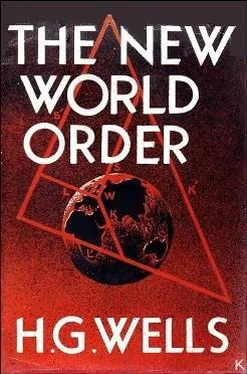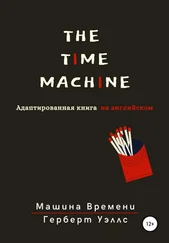Герберт Уэллс - The New World Order
Здесь есть возможность читать онлайн «Герберт Уэллс - The New World Order» весь текст электронной книги совершенно бесплатно (целиком полную версию без сокращений). В некоторых случаях можно слушать аудио, скачать через торрент в формате fb2 и присутствует краткое содержание. Год выпуска: 1940, Жанр: Политика, Публицистика, на английском языке. Описание произведения, (предисловие) а так же отзывы посетителей доступны на портале библиотеки ЛибКат.
- Название:The New World Order
- Автор:
- Жанр:
- Год:1940
- ISBN:нет данных
- Рейтинг книги:4 / 5. Голосов: 1
-
Избранное:Добавить в избранное
- Отзывы:
-
Ваша оценка:
- 80
- 1
- 2
- 3
- 4
- 5
The New World Order: краткое содержание, описание и аннотация
Предлагаем к чтению аннотацию, описание, краткое содержание или предисловие (зависит от того, что написал сам автор книги «The New World Order»). Если вы не нашли необходимую информацию о книге — напишите в комментариях, мы постараемся отыскать её.
The New World Order — читать онлайн бесплатно полную книгу (весь текст) целиком
Ниже представлен текст книги, разбитый по страницам. Система сохранения места последней прочитанной страницы, позволяет с удобством читать онлайн бесплатно книгу «The New World Order», без необходимости каждый раз заново искать на чём Вы остановились. Поставьте закладку, и сможете в любой момент перейти на страницу, на которой закончили чтение.
Интервал:
Закладка:
Following upon this campaign for the conclusive interment of the played-out party system, there comes the necessity for a much more strenuous search for administrative and technical ability throughout the country. We do not want to miss a single youngster who can be of use in the great business of making over Great Britain, which has been so rudely, clumsily and wastefully socialised by our war perturbations, so that it may become a permanently efficient system.
And from the base of the educational pyramid up to its apex of higher education for teachers, heads of departments and research, there is need for such a quickening of minds and methods as only a more or less organised movement of sanely critical men can bring about. We want ministers now of the highest quality in every department, but in no department of public life is a man of creative understanding, bold initiative and administrative power so necessary as in the Education Ministry.
So tranquil and unobtrusive has been the flow of educational affairs in the British Empire that it seems almost scandalous, and it is certainly "vulgar", to suggest that we need an educational Ginger Group to discover and support such a minister. We want a Minister of Education who can shock teachers into self-examination, electrify and rejuvenate old dons or put them away in ivory towers, and stimulate the younger ones. Under the party system the Education Ministry has always been a restful corner for some deserving party politician with an abject respect for his Alma Mater and the permanent officials. During war time, when other departments wake up, the Education Department sinks into a deeper lethargy. One cannot recall a single British Education Minister, since there have been such things in our island story as Ministers for Education, who signified anything at all educationally or did anything of his own impulse that was in the least worth while.
Suppose we found a live one-soon-and let him rip!
There again is something to be done far more revolutionary than throwing bombs at innocent policemen or assassinating harmless potentates or ex-potentates. And yet it is only asking that an existing department be what it pretends to be.
A third direction in which any gathering accumulation of sanity should direct its attention is the clumsy unfairness and indirectness of our present methods of expropriating the former well-to-do classes. The only observable principle seems to be widows and children first. Socialisation is being effected in Britain and America alike not by frank expropriation (with or without compensation) but by increasing government control and increasing taxation. Both our great communities are going into socialism backward and without ever looking round. This is good in so far as that technical experience and directive ability is changed over step by step from entirely private employment to public service, and on that side sane and helpful citizens have little to do beyond making the process conscious of itself and the public aware of the real nature of the change, but it is bad in its indiscriminate destruction of savings, which are the most exposed and vulnerable side of the old system. They are expropriated by profit-control and taxation alike, and at the same time they suffer in purchasing power by the acceleration of that process of monetary inflation which is the unavoidable readjustment, the petition in bankruptcy, of a community that has overspent.
The shareholding class dwindles and dies; widows and orphans, the old who are past work and the infirm who are incapable of it, are exposed in their declining years to a painful shrinkage of their modes of living; there is no doubt a diminution of social waste, but also there is an indirect impoverishment of free opinion and free scientific and artistic initiative as the endless societies, institutions and services which have enriched life for us and been very largely supported by voluntary subscriptions, shrivel. At present a large proportion of our scientific, artistic, literary and social workers are educated out of the private savings fund. In a class-war revolution these economically very defenceless but socially very convenient people are subjected to vindictive humiliation-it is viewed as a great triumph for their meaner neighbours-but a revolution sanely conducted will probably devise a system of terminable annuities and compensation, and of assistance to once voluntary associations, which will ease off the social dislocations due to the disappearance of one stratum of relatively free and independent people, before its successors, that is to say the growing class of retired officials, public administrators and so forth, find their feet and develop their own methods of assertion and enterprise.
10. DECLARATION OF THE RIGHTS OF MAN
Let us turn now to another system of problems in the collectivisation of the world, and that is the preservation of liberty in the socialist state and the restoration of that confidence without which good behaviour is generally impossible.
This destruction of confidence is one of the less clearly recognised evils of the present phase of world-disintegration. In the past there have been periods when whole communities or at least large classes within communities have gone about their business with a general honesty, directness and sense of personal honour. They have taken a keen pride in the quality of their output. They have lived through life on tolerable and tolerant terms with their neighbours. The laws they observed have varied in different countries and periods, but their general nature was to make an orderly law-abiding life possible and natural. They had been taught and they believed and they had every reason to believe: "This (that or the other thing) is right. Do right and nothing, except by some strange exceptional misfortune, can touch you. The Law guarantees you that. Do right and nothing will rob you or frustrate you."
Nowhere in the world now is there very much of that feeling left, and as it disappears, the behaviour of people degenerates towards a panic scramble, towards cheating, over-reaching, gang organisation, precautionary hoarding, concealment and all the meanness and anti-social feeling which is the natural outcome of insecurity.
Faced with what now amounts to something like a moral stampede, more and more sane men will realise the urgency for a restoration of confidence. The more socialisation proceeds and the more directive authority is concentrated, the more necessary is an efficient protection of individuals from the impatience of well-meaning or narrow-minded or ruthless officials and indeed from all the possible abuses of advantage that are inevitable under such circumstances to our still childishly wicked breed.
In the past the Atlantic world has been particularly successful in expedients for meeting this aspect of human nature. Our characteristic and traditional method may be called the method of the fundamental declaration. Our Western peoples, by a happy instinct, have produced statements of Right, from Magna Carta onwards, to provide a structural defence between the citizen and the necessary growth of central authority.
And plainly the successful organisation of the more universal and penetrating collectivism that is now being forced upon us all, will be frustrated in its most vital aspect unless its organisation is accompanied by the preservative of a new Declaration of the Rights of Man, that must, because of the increasing complexity of the social structure, be more generous, detailed and explicit than any of its predecessors. Such a Declaration must become the COMMON FUNDAMENTAL LAW of all communities and collectivities assembled under the World Pax. It should be interwoven with the declared war aims of the combatant powers now; it should become the primary fact in any settlement; it should be put before the now combatant states for their approval, their embarrassed silence or their rejection.
Читать дальшеИнтервал:
Закладка:
Похожие книги на «The New World Order»
Представляем Вашему вниманию похожие книги на «The New World Order» списком для выбора. Мы отобрали схожую по названию и смыслу литературу в надежде предоставить читателям больше вариантов отыскать новые, интересные, ещё непрочитанные произведения.
Обсуждение, отзывы о книге «The New World Order» и просто собственные мнения читателей. Оставьте ваши комментарии, напишите, что Вы думаете о произведении, его смысле или главных героях. Укажите что конкретно понравилось, а что нет, и почему Вы так считаете.

![Герберт Уэллс - The War of the Worlds [С англо-русским словарем]](/books/26611/gerbert-uells-the-war-of-the-worlds-s-anglo-thumb.webp)










